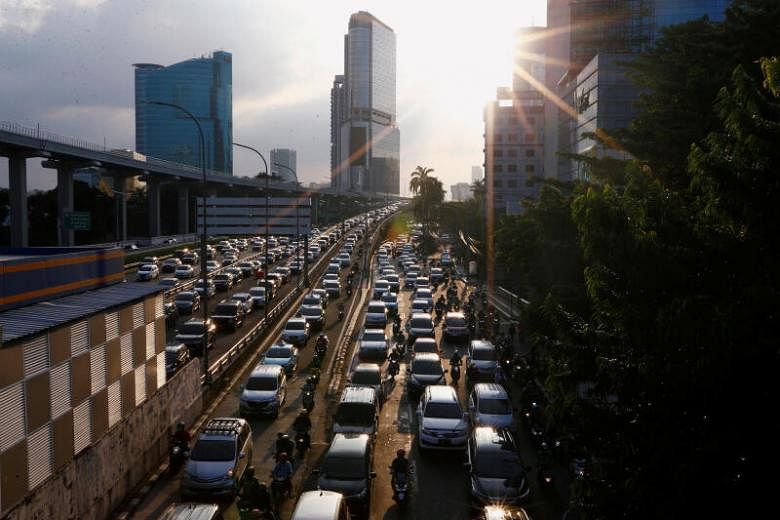SINGAPORE - Many countries around the world are expected to go into a recession as a result of the Covid-19 pandemic but, in Indonesia, it is also threatening the reform plans of President Joko Widodo.
It was a little over a year ago that Mr Joko, who is more popularly known to his countrymen as Jokowi, triumphed at the ballot box to clinch a second and final term in office.
Sworn into office again on Oct 20, endowed with a majority government and enjoying widespread popularity, he was poised to jump-start economic growth in Indonesia which had been stagnant at around 5 per cent since he first became president in 2014.
In the run-up to his re-election, Mr Joko vowed to overhaul the bureaucracy, shore up foreign investment and push through major infrastructure projects. After the poll he announced his most ambitious plan yet to move the administration of the country from the current capital, Jakarta, the world's fastest-sinking city, on the island of Java, to East Kalimantan on Borneo.
Then, the coronavirus struck.
Now, the death toll in Indonesia from Covid-19, the disease caused by the coronavirus, is the highest in South-east Asia with about 1,200 deaths as of Wednesday.
The economic outlook for the country, at least for the rest of the year, appears bleak and Mr Joko may have to put his reform plans on the back-burner, analysts say.
Economist Bhima Yudhistira Adhinegara from the Institute for Development of Economics and Finance said the plan to move the capital would be "hard to achieve not only in the next five years, but 10 years even".
"The burden of economic recovery is rather heavy. The budget will be used to pay off interest on debt and finance fiscal stimulus measures. It is not possible to undertake mega projects such as moving the capital," he told The Straits Times.
The cost has mounted because of the government's slow, tepid response to the pandemic, especially in the initial and crucial stages with inadequate testing and refusal to impose a nationwide lockdown. Ironically, that response was aimed at protecting the livelihoods and the economy of the world's fourth-largest nation of 270 million people.
Indonesia's economy grew only 2.97 per cent between January and March this year compared with the same quarter a year ago, the weakest quarterly performance since 2001.
Finance minister Sri Mulyani Indrawati pointed to a possible recession. While the economy is expected to grow by a mere 2.3 per cent in 2020, the government has prepared for the worst case scenario of 0.4 per cent contraction in GDP, she said.
Some 5.2 million people are at risk of losing their jobs and the ranks of the poor could swell by 3.78 million.
Finance ministry figures show the government has committed to spending 641.15 trillion rupiah (S$61.75 billion) to help mitigate the fallout from the crisis, including on businesses.
"The pressure to help failing local businesses and address unemployment will force Jokowi to de-prioritise reforms to attract foreign investment," said a report by specialist global risk consultancy Control Risks.
"For months after the pandemic subsides, policymaking will centre on efforts to rescue local companies - especially labour-intensive ones - and stimulate domestic consumption," the report added.
Mr Hariyadi Sukamdani, chairman of a powerful business lobby group, the Indonesian Employers Association (Apindo), said many local businesses, such as in retail, agriculture and manufacturing, had enough funds only to last through June. He said they would go bust without a government rescue plan and if current widespread social distancing measures were prolonged.
"We want the measures to be relaxed otherwise we will collapse," he told The Straits Times. "Since resources are limited, government spending on things such as infrastructure (projects) should be delayed first."
Already, deliberations on Mr Joko's much-hailed omnibus Bill on job creation to attract foreign investors have been postponed, pending further scrutiny. The Bill aims to ease labour laws, simplify procedures to secure business permits, among other things.
Analysts say that going forward, foreign investors who can create massive employment and help the government rescue distressed sectors should be welcomed.
The year 2020 was meant to be a key year for Mr Joko's plans to burnish his legacy before leaving office. But, at the very least, most analysts agree that that timeline has been delayed.
They have also cautioned against any rush to lifting Covid-19 restrictions to jump-start the economy and save businesses as well as livelihoods .
Mr Bhima said: "Indonesia hasn't flattened the curve, in fact the curve is rising. Relaxing any restrictions now is very risky to health."
He projected the economy would recover in the final quarter of the year if the country continued with social distancing measures and followed health protocols.
"We really need the government to be consistent in its policy," he said.
As neighbouring Malaysia and Singapore begin to lift containment curbs, Indonesia is also mulling over an exit strategy as early as June.












